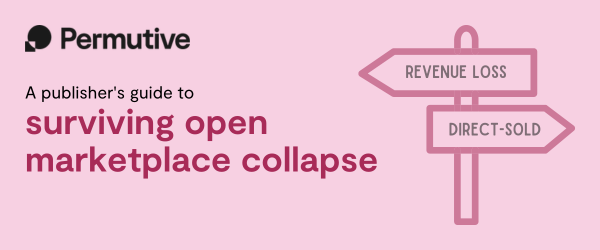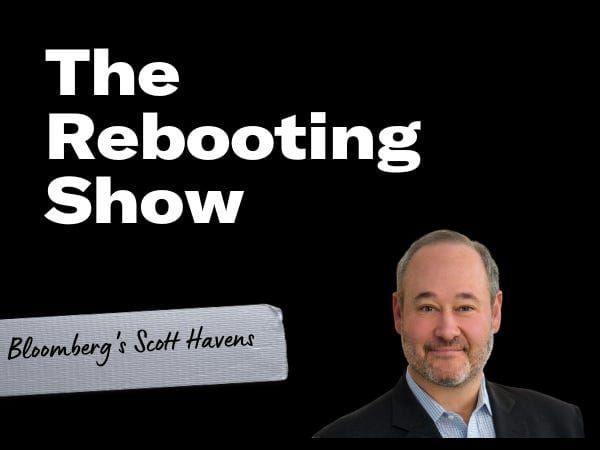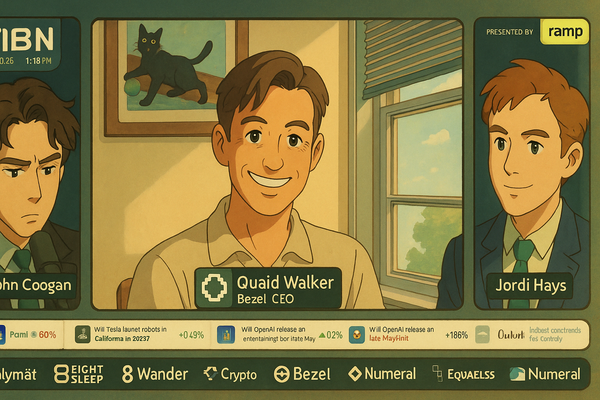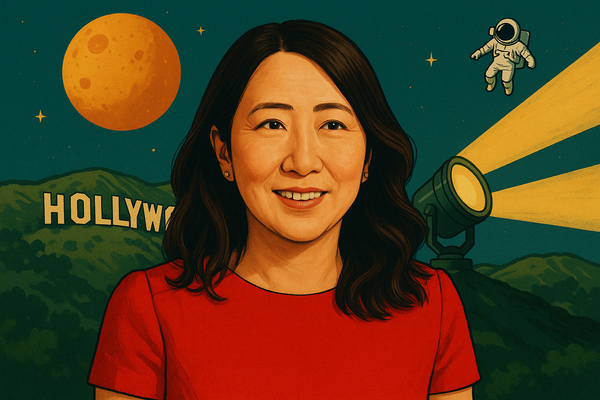Bloomberg Media CEO Scott Havens on why publishers should mostly embrace AI
“There’s no use crying over spilled milk”

Beginning this fall, we are hosting a series of executive dinners around specific themes. Right now, all are in New York City, although I’d like to do them in other cities.
- In September, in partnership with Permutive, we’re gathering together revenue and programmatic executives at publishers to focus on reorienting to direct sales and use of first-party data.
- In October, we are holding a Video Leadership Dinner in partnership with VideoElephant to discuss ways publishers are using video effectively to drive more revenue.
- Later that month, we’ll also have a dinner with Ex.co that will gather publisher revenue and product executives for conversations about revenue diversification.
Sign up for more information – and get in touch for sponsorship opportunities for future dinners around themes like subscriptions, commerce and more. My email is brian@therebooting.com.
This week, I decided to write about Elon Musk’s… actually, I didn’t. I spoke to Bloomberg Media CEO Scott Havens about how to prepare for but not freak out about the AI era. First up, a message from The Rebooting supporter Permutive, which helps publishers build their direct-sold ad businesses.

RIP, open marketplace

The rate of consumers opting out of their data being used for hyper-targeting and tracking is transforming the advertising industry. The combination of users choosing cookie-blocking browsers and opting out of tracking on Chrome leads to 70% of the Internet being invisible to adtech. It’s time for CROs and publisher sales teams to look beyond OMP revenue, and focus on direct-sold partnerships. This guide will help you adapt in the changing landscape and enable you to build a direct-sold strategy that drives revenue.
Bloomberg Media’’s Scott Havens on the AI threat/opportunity

I spoke to Scott Havens, the CEO of Bloomberg Media, for this week’s episode of The Rebooting Show. Scott and I have spoken many times over the years, going back to his five years at Atlantic Media and then when he was chief digital officer at Time. In January 2022, Scott succeeded Justin Smith as CEO of Bloomberg Media.
He readily admits the advantages of The Terminal – the media business is large but still under 5% of Bloomberg LP’s business – while adding that Bloomberg Media is not immune to the pressures of the media industry.
Perhaps the biggest near-term challenge to publishers is the rolling changes to the search experience as Google looks to avoid being outflanked by ChatGPT and other AI search engines like Bing. There is a broad agreement among top publishers that they will not go along with AI sucking in their content and regurgitating it in a generative search experience that negates the need for people to visit the sites that created the content in the first place. That’s a death knell. There’s a reason publishers want billions in payments; the math won’t work for many without search traffic to monetize.
“I don't know that all of the people that are building these LLMs thought about the ramifications necessarily. I'm not pollyannaish about it, but I think they're trying to build a really cool technological platform, and it just so happens that it could be a threat to the publishing industry.”
For publishers, this is a familiar story, having spent a generation dealing with tech platforms wreaking havoc on their business models. Algorithms are fickle by design, so if anything, publishers are trained to deal with wholesale changes to distribution dynamics.
“When you start playing around with [Google generative search], you realize the impact it could have on search traffic around the web. Obviously people are worried about that. There have been some vocal media moguls out there pounding the table about making sure that they're compensated for their IP. There should be a value exchange here. The simple value change with Google for traffic is different, especially if the traffic isn’t there.”
At the same time, Bloomberg is embracing AI tools, as it has for several years. It has already rolled out BloombergGPT for financial information, and Bloomberg Media is using AI tools for productivity, translation, video clips, and summarization. “It should be accretive to the product,” he said.
“The question is how do we as publishers leverage the power of this incredible computing so our users are more engaged that they'll pay a subscription fees, come to us directly, and they'll stay with us as a customer. That's what we should be doing.”
The early publisher forays into AI have been focused on efficiency for the most part. G/O Media’s use of AI has angered its workers, and CNET’s attempts to use AI to produce content have similarly raised hackles. Google’s working on an AI “helpmate” tool for journalists that’s “unsettling” to those who have seen the preview. Scott doesn’t see ChatGPT replacing Bloomberg journalists anytime.
“We're in a premium business media space where our audience are leaders and executives of companies, of governments, nonprofits. That type of information, they need it to be successful. I don't see a world where AI is replicating that.”
So, while a threat in some ways, AI will continue to advance and change the environment. The only way to deal with evolution is to change.
“It's the same perspective I had with the rise of the social media platforms. You can cry over spilled milk or you can go work with the guys who control the biggest audiences in human existence, and build a model on top of them as part of your offering, not as your sole offering.”
Check out the full episode for more on AI’s impact, the ad outlook after a rough start to the year, and how events became nearly a quarter of Bloomberg Media’s revenue. The Rebooting Show is available on Apple, Spotify and most other podcasting platforms.
Recommendations
Why email: I spoke to The Rebooting supporter Impact.com about why email newsletters have seen a resurgence in popularity as the value of direct and durable connections has risen. (Impact)
The Portnoy effect: Could any institutional media brand have the kind of impact Barstool’s Dave Portnoy has on pizza places? (Slate)
Whither Cheddar: I never fully understood Cheddar, although Jon Steinberg is perhaps the preeminent salesman of his generation, including why its logo was swiss cheese. Altice’s $200 million buy of it in 2019 was a masterstroke by Jon, and now Altice is looking to unload Cheddar for what will almost assuredly be a fraction of that price. (Dealbook)
The media business is hard: Jeff Bezos has owned The Washington Post for a decade. It’s set to lose $100 million this year. (NYT)
Keeping up with the creators: I rely on former VidCon CEO Jim Louderback to make heads or tails of the creator world with his reliably excellent Inside the Creator Economy newsletter. Even better: It’s published on LinkedIn, the greatest of social platforms. (Inside the Creator Economy)*
*This is a newsletter swap but I read Jim’s each week and find it valuable, so check it out.
Thanks for reading, and thanks to Permutive for sponsoring. Check out their guide to navigating the decline of the programmatic open marketplace.
On Thursday, I’ll have a newsletter that digs into why events have moved from a side hustle to a critical part of many publishing business models. As Semafor CEO Justin Smith told me, “They’re the highest profit business models adjacent to journalism.”




